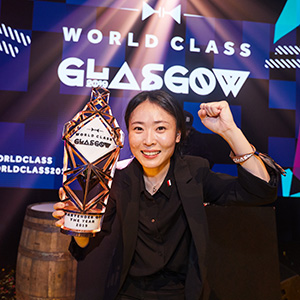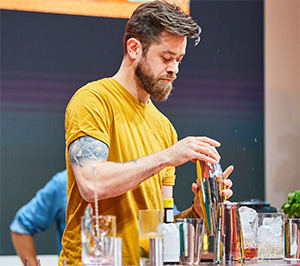Bannie Kang of Singapore bar ANTI:DOTE wins World Class 2019. GB’s Cameron Attfield places 4th

Describing World Class as a ‘big competition’ is a colossal understatement. While I had some idea of World Class’s scope, having judged regional heats and a GB semi-final in previous years, I wasn’t prepared for the scale of the global final when I arrived in Glasgow last week. The modestly named ‘Hub’ that Diageo Reserve had created in the city’s West End would put some English villages to shame in terms of size and population, and most remarkable of all, the organisation of what was essentially a mini-festival ran like a well oiled machine. On a logistical front alone, the World Class 2019 final was deeply impressive.
Rather than the standard cocktail competition finale format of everyone taking turns to make their drink on a big stage, the World Class final is a multi-stage affair that tests bartenders over multiple challenges. I arrived in Glasgow on the Wednesday just as the Johnnie Walker challenge was beginning, but prior to this the finalists had first travelled to Schiedam in the Netherlands for the Ketel One challenge, and then to the Isle of Skye for the Talisker challenge. There were also challenges in Glasgow that focused on The Singleton malt whisky, and Tanqueray No.10 Gin, and for the eventually-selected top 8 competitors, a speed round held in in a huge room in front of about 600 people.
It may sound like an odd comparison, but this sort of multi-stage contest put me in mind of a snooker player getting close to a 147 break during the World Championships. Pundits say this is the most difficult thing to achieve in sport because the player has to make 36 perfect shots, without missing a single pot or making any mistakes. All of the players at the Snooker World Championship are potentially capable of doing it, but the level of consistency and grace under pressure required to pull it off is extreme, meaning only a handful of great players have achieved it.

The same goes for the World Class final. Having got through intensely competitive regional heats and finals, it is safe to say that any of the 53 World Class finalists from around the world were capable of lifting the trophy, but the ultimate winner would be the bartender who could perform consistently enough to nail the majority of the challenges. This requires a huge amount of preparation and focus, making the World Class final very much a ‘bartender’ competition, as opposed to a cocktail competition. Having seen it in person, I can really appreciate how difficult it is to win World Class, and have enormous respect for the bartenders who attempt to do so.
The number of competitors and spread-out nature of the challenges meant it was impossible to see everyone in action, but I did watch GB champ Cameron Attfield in the Singleton and Johnnie Walker challenges. He was slick and confident in both, and it came as no surprise when he was named in the top 8 who would go on to compete in the final challenge – the speed round. This took place in the Hub’s main space, which was very warm, and packed with an audience of at least 600 people. As he stepped onto the stage, I remember thinking to myself that I would fall apart if I found myself up there, but Cameron’s performance was composed and quick, coming in at 6:57 with just one time penalty (to put that in perspective, the bartender before took over 8 minutes and accrued 3 penalties).
Cameron can be hugely proud of his performance during this World Class campaign. To win the GB championship is no small feat, and to place 4th out of a field of 53 extraordinarily talented bartenders is a massive achievement. He is a worthy champ for Great Britain, and I hope he is currently enjoying a few well earned days of stress-free R&R.
However, as much as I would have liked to see the World Class trophy come back to Great Britain, it was Singapore’s Bannie Kang who came out on top. Kang’s performance during the speed round was relaxed to the point it made it look as if she was on a shift at her own bar, and she was lightning fast. If this was any indication of her performance in the previous challenges, Bannie Kang would have been very difficult to beat. Singapore can be very proud of its new champion.
Bannie Kang said of her win: “This has been an incredible experience. It’s been a lot of fun and a lot of hard work – a real whirlwind. I’d like to say well done to all the finalists – there were so many incredible drinks created this week it could have been any of us who won. I’ve learnt a lot and made some friends for life. It was a privilege to spend the last five days with these guys, working with these incredible spirits brands, at the best bartending competition in the world. To have won is the cherry on the cake.”
You will probably see quite a lot of Bannie Kang over the following months, as she will now spend the next 12 months travelling the world and judging World Class national heats, working with 2020 competition hopefuls, and crowning regional champions, and working as a global ambassador for Diageo’s Reserve brands.


